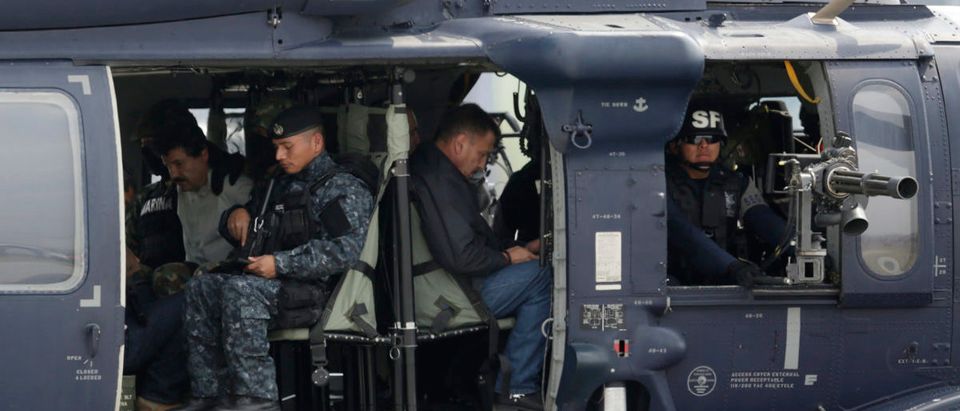Escalating cartel violence in Mexico, along with an upsurge in heroin and fentanyl-related deaths inside the U.S., make plain the need for a new and vigorous approach to the nation’s existing, 50-year documented failure to secure our southern border.
On March 13, 2019, Judicial Watch published comprehensive documentation detailing exactly how Mexican Cartels meet the U.S. government’s requirements for designation as Foreign Terrorist Organizations (FTOs). Designating Mexican drug cartels as FTOs will expand the tool set available to government agencies to fight the cartels and send a message that if Mexico cannot deal with the crisis, America will.
Last week President Trump said that the process was underway to designate the cartels as FTOs. The idea has been debated in policy circles for years, but the impetus now may be related to last month’s slaying of three American women and six children in northern Mexico. Relatives of the victims uploaded a petition on the White House website calling for action, saying “they are terrorists, and it’s time to acknowledge it.”
President Trump tweeted that the time had come “for Mexico, with the help of the United States, to wage WAR on the drug cartels and wipe them off the face of the earth.” The cartels are already at war (and have been for years); on Saturday a column of fourteen vehicles containing suspected cartel members raided the Mexican town of Villa Union. The shootout that followed left twenty-one dead, among them police, government workers, cartelistas, and innocent bystanders.
Designating the cartels (among the most violent: Jalisco New Generation Cartel, Los Zetas, Juárez and Sinaloa) as FTOs empower the Treasury Department to freeze assets of the cartels and deny access to the U.S. banking system. Grabbing and/or freezing cartel money, securities, instruments, assets and financial transactions around the globe would have a paralyzing effect. Also, members or associates of cartels would be banned from the United States and subject to arrest or deportation if they crossed the border. The U.S. could “flag” cartel-affiliated persons with Interpol, complicating their international travel. More importantly, the cartels would be subject to the same types of countermeasures the United States employs against other terrorist organizations, including raids, drone strikes, and extraordinary rendition.
There is ample statutory authority for the move. Section 219 of the Immigration and Nationality Act authorizes the Secretary of State, in consultation with the secretary of the treasury and the attorney general, to designate an organization as a FTO if the secretary finds that the organization is foreign, engages in terrorist activity, and threatens the security of United States nationals or the national security of the United States. The Mexican cartels check all three boxes.
In addition to the public safety threats posed by illegal narcotics and the attendant violence of the drug trade, the cartels engage in arms smuggling, kidnapping, human trafficking, money laundering, extortion and cyber-crime. Their activities contribute to the deaths of more Americans every year than radical Islamist terror groups (whom the cartels sometimes cooperate with – i.e., Hezbollah), and most of their victims are inside the United States.
There is even bipartisan support for the FTO designation. Democratic presidential aspirant Mayor Pete Buttigieg said the idea “should be on the table, because [the cartels are] spreading terror.” Yet there has been the usual resistance from the Washington bureaucracy and congressional Democrats. Proposed legislation sponsored by House Republicans calling for the designation has not moved forward.
And last summer acting Drug Enforcement Administration (DEA) chief Uttam Dhillon said his organization had sufficient authority to fight the cartels but needed “the cooperation of our various foreign governments to attack them more effectively.”
It is astounding that Dhillon heads the DEA, given he made headlines as White House deputy counsel on Jan. 5, 2018, when the New York Times reported that he intentionally misled President Trump to try to stop him from firing then-FBI Director James Comey. How a lawyer who lies to the president gets the DEA job as a “consolation prize” is one question — why anyone would believe him is another.
Likewise, anyone with experience in Washington knows that there are a hundred ways to say “No” to new ideas. In fact, “No” is the default setting for most bureaucrats faced with a policy change. Opponents of the move are throwing everything they have against it, saying it would detract from the fight against Islamic terrorism; there are insufficient resources to implement it; that it would increase agency workloads; there are no implementation plans ready to go; and other such hollow talking points that can better be summed up as, “We don’t want to do it.”
None of these objections stand up. Experts tasked to fight Islamic terror groups will not suddenly be shifted wholesale to the cartel case – though to the extent the cartels act in concert with organizations like Hezbollah there can be useful synergies. Resources and workloads will be adjusted, but they should be; after all, if what we have isn’t working why continue down the same failed path? And if plans for implementing the policy don’t exist, you can bet they will be drawn up as soon as the designation is official. The United States can walk and chew gum at the same time.
President Trump is moving ahead with the FTO designation regardless of the objections. And once the designation is made, government officials must drop their protests and use their new powers to energetically and faithfully carry out the president’s policy to bring the war to the cartels. Those in government who find they can’t comply need to resign or be fired.
Chris Farrell is director of investigations and research for Judicial Watch, a nonprofit watchdog group. He previously worked as a counterintelligence case officer.
The views and opinions expressed in this commentary are those of the author and do not reflect the official position of The Daily Caller.


